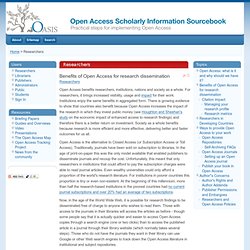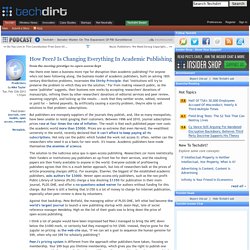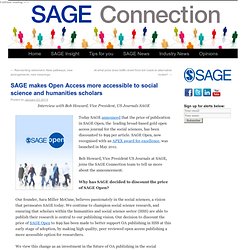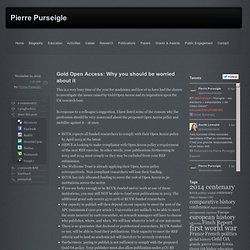

Benefits of Open Access for research dissemination. Open Access benefits researchers, institutions, nations and society as a whole.

For researchers, it brings increased visibility, usage and impact for their work. Institutions enjoy the same benefits in aggregated form. There is growing evidence to show that countries also benefit because Open Access increases the impact of the research in which they invest public money (see Houghton and Sheehan's study on the economic impact of enhanced access to research findings) and therefore there is a better return on investment. Society as a whole benefits because research is more efficient and more effective, delivering better and faster outcomes for us all. Open Access is the alternative to Closed Access (or Subscription Access or Toll Access). Now, in the age of the World Wide Web, it is possible for research findings to be disseminated free of charge to anyone who wishes to read them.
Repositories can provide usage data to show the number of times articles have been downloaded. PeerJ (E.U) How PeerJ Is Changing Everything In Academic Publishing. Has there ever been a business more ripe for disruption than academic publishing?

For anyone who's not been following along, the business model of academic publishers, built on solving 18th century distribution problems, incarnates the Shirky Principle: that "Institutions will try to preserve the problem to which they are the solution. " Far from making research public, as the name "publisher" suggests, their business now works by accepting researchers' donations of manuscripts, refining them by other researchers' donations of editorial services and peer review, assuming copyright, and locking up the results -- work that they neither wrote, edited, reviewed or paid for -- behind paywalls. By artificially causing a scarcity problem, they're able to sell solutions to that problem: subscriptions. But publishers are monopoly suppliers of the journals they publish, and, like so many monopolists, have been unable to resist gouging their customers. SAGE makes Open Access more accessible to social science and humanities scholars.
Interview with Bob Howard, Vice President, US Journals SAGE Today SAGE announced that the price of publication in SAGE Open, the leading broad-based gold open access journal for the social sciences, has been discounted to $99 per article.

SAGE Open, now recognised with an APEX award for excellence, was launched in May 2011. Bob Howard, Vice President US Journals at SAGE, joins the SAGE Connection team to tell us more about the announcement. Why has SAGE decided to discount the price of SAGE Open? Gold Open Access: Why you should be worried about it. This is a very busy time of the year for academics and few of us have had the chance to investigate the issues raised by Gold Open Access and its imposition upon the UK research base.

In response to a colleague’s suggestion, I have listed some of the reasons why the profession should be very concerned about the proposed Open Access policy and mobilize against it – at once. RCUK expects all funded researchers to comply with their Open Access policy by April 2013 at the latest.HEFCE is looking to make compliance with Open Access policy a requirement of the next REF exercise. In other words, your publications forthcoming in 2013 and 2014 must comply or they may be excluded from your REF submission.The Wellcome Trust is already applying their Open Access policy retrospectively. Proponents of this Gold Open Access policy have been moving fast, aggressively and relentlessly. Like this: Like Loading...
Open Access to Scholarly Publishing. Documenta Mathematica.
Les coûts de publication en libre accès / Actualités - Coopérer en information scientifique et technique - Cirad. Tim Berners-Lee plaide pour l'accès libre aux travaux universitaires. Tim Berners-Lee, le principal inventeur du World Wide Web, ne croit pas que le modèle de l'édition universitaire verrouillée par un accès payant soit durable.

The Conversation rapporte ses propos, tenus avant-hier en Australie: "Je pense que les militants de l'accès libre [open access] vont l'emporter", a déclaré Sir Tim [la reine Elisabeth l'a anobli en 2004] mardi 29 janvier. "De nombreux éditeurs vont se rendre compte que c'est comme ça que ça se passe. La mort tragique d'Aaron Swartz a... amené toute cette bataille à l'attention de beaucoup de gens", a-t-il dit, ajoutant qu'un modèle d'accès ouvert apporte le plus grand bénéfice au plus grand nombre de gens.
Pour lui, beaucoup de recherches sont financées sur fonds publics et devraient en conséquence être ouvertes au public. Le 2 mai 2012, David Willetts, le ministre anglais des Universités et de la Science, avait prononcé un discours devant l'Association des éditeurs (Publishers Association). Tableau: "Le rat de bibliothèque" (1850)